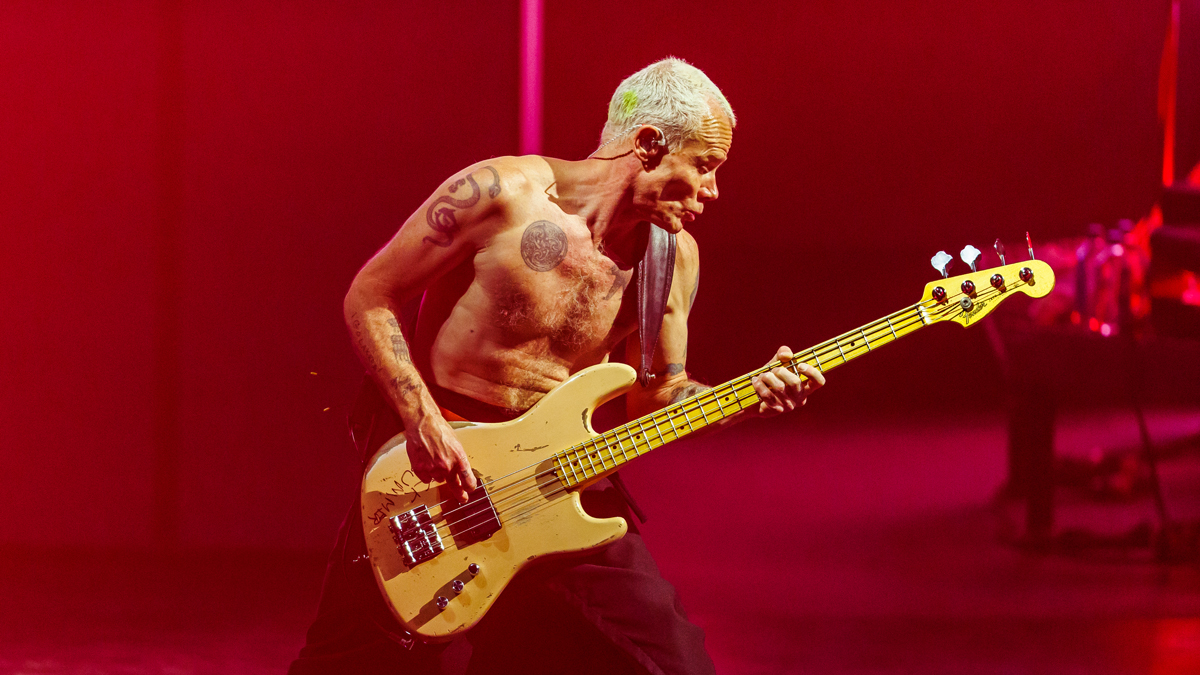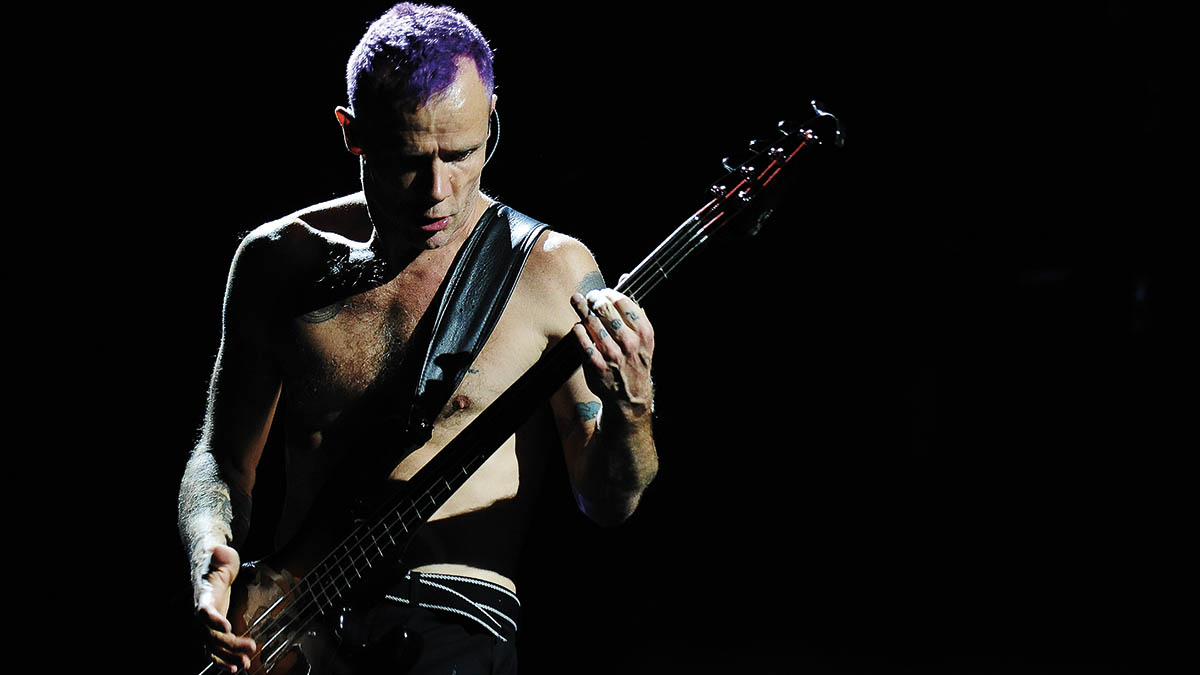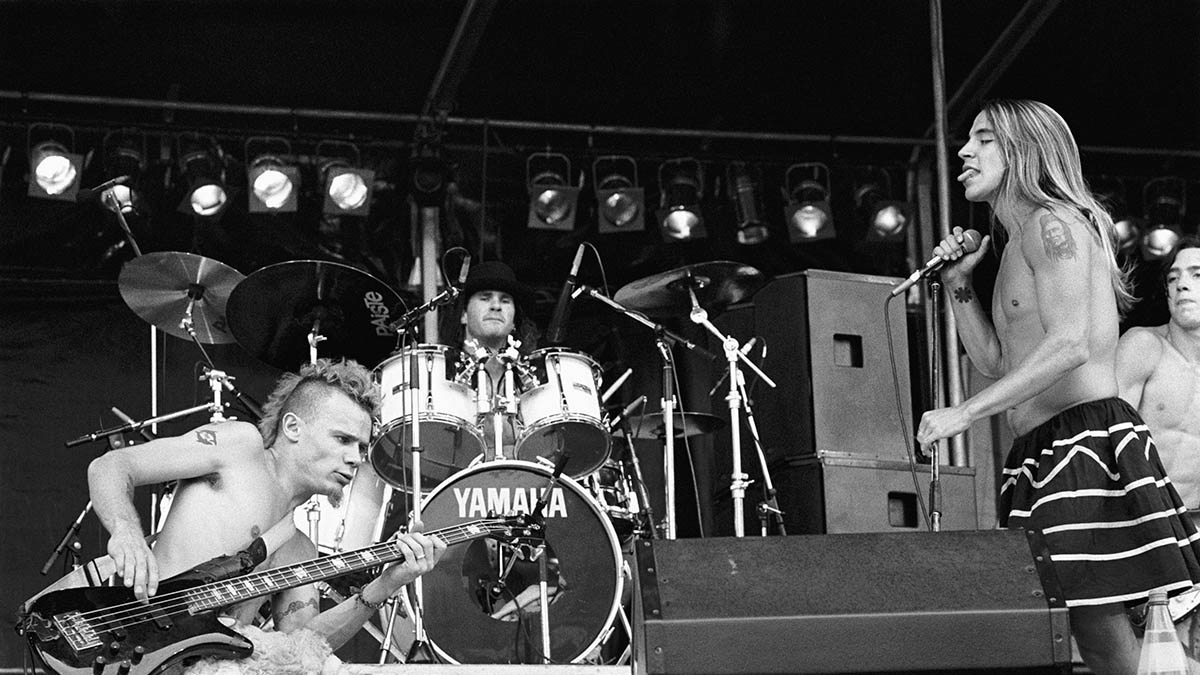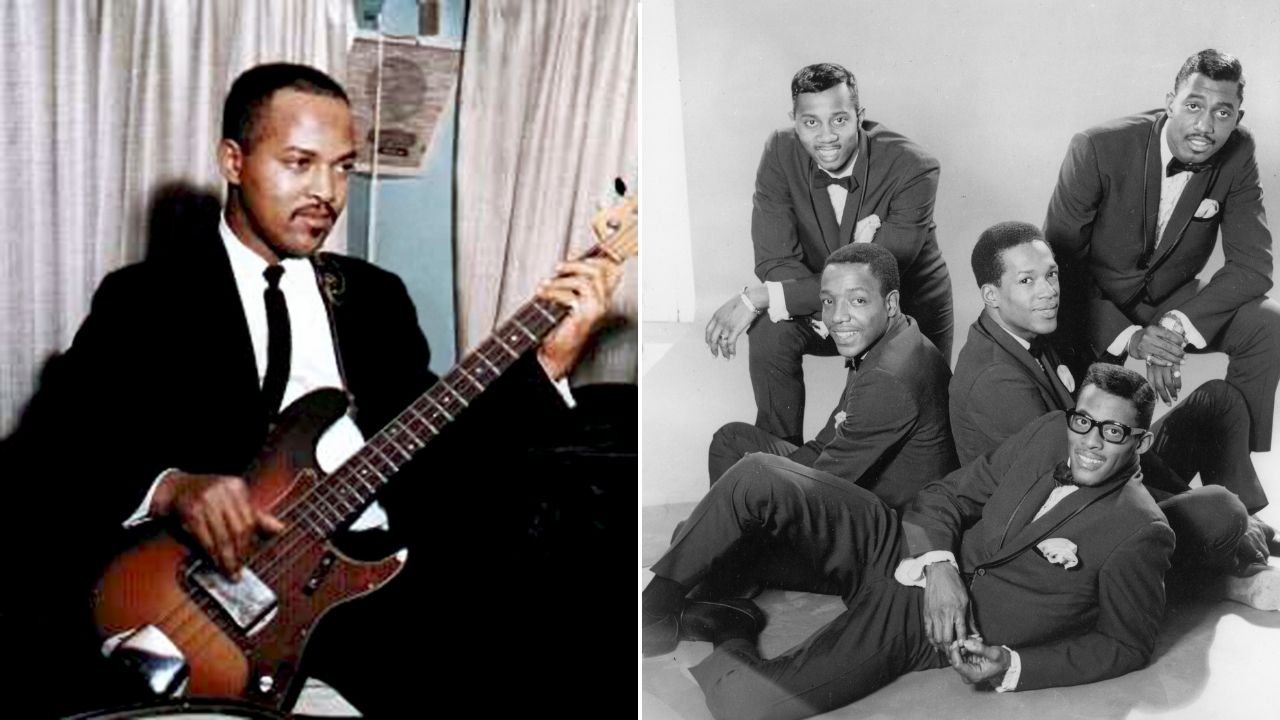Flea: “I think about playing bass as like a river. I can unleash it however it needs to go – like violent rapids, or a calm, still pool”
The Red Hot Chili Peppers’ new album, Unlimited Love, is a showcase for Flea’s irrepressible talents, but as he explains, he’s always looking to improve

“We work hard,” wrote Red Hot Chili Peppers bassist Michael ‘Flea’ Balzary in the liner notes of 2004’s Greatest Hits album, a world away from the club-level act that his band had been two decades before. That hard work has led him to the position of Best Bassist in multiple polls in this magazine – even though, as he tells us, he’s nowhere near being the bassist that he really wants to be. It’s our job to find out why.
An Australian who moved to California as a kid and endured a tough childhood which you can read all about in his 2019 autobiography Acid For The Children, Flea – so nicknamed for his habit of leaping about on stage, like you didn’t know that already – is probably his demographic’s most visible bass guitar player. He won his category in BP’s 100 Greatest Bassists Poll by a significant margin, indicating that many of you reading this would agree with that assessment.
A jazz- and punk-rock obsessive since his early days, Flea’s bass parts are deft without being over-polished, fast without lacking heart, and infused with a hippie West Coast sensibility that is equal parts Larry Graham and Peter Hook. Nowhere is this more evident than on the Chili Peppers’ new album, Unlimited Love, whose title may sound like a rom-com, but whose contents definitely deserve your attention.
Produced by Rick Rubin and featuring the returning John Frusciante’s first work with the band since 2009 – when he was replaced by Josh Klinghoffer, who he replaced in turn two years ago – Unlimited Love is a subtler RHCP record than many fans will expect.
Generally quieter and less aggressive than their best-known albums Mother’s Milk (1989), Blood Sugar Sex Magik (1991) and Californication (1999), the album leaves plenty of space for Flea to fill with a variety of bass parts – and fill them he does. We sat down with the perennial punk of funk to see where his head is at in 2022...
Did you record Unlimited Love the old-school way – together in the studio?
“Yeah, absolutely. We don’t know any other way. We like to record live to tape, with all of us playing together in a room, looking at each other playing, feeling each other playing, like we’ve always done it.
All the latest guitar news, interviews, lessons, reviews, deals and more, direct to your inbox!
“We sit in a rehearsal room for months on end, writing, jamming, laughing, arguing, and at a certain point, the shit has been honed and nurtured, so we go in and put it on tape and play it for Rick. He makes his comments and then we record it.”
John was gone for 10 years, and the first second that we started jamming together again, it was just like talking. We were both yearning for the same thing to happen
I assume that when you play with John Frusciante, it’s like putting on a pair of comfortable old sneakers, or am I way off?
“No, no, that’s it. That’s a really correct assumption. You know, John was gone for 10 years, and the first second that we started jamming together again, it was just like talking. We were both yearning for the same thing to happen, and when the thing happens, we’re both completely conscious that it’s happening.
“It’s like that with the four of us, not just me and John. It was like that with Josh too, who is a beautiful musician, and not only a beautiful musician but a great person – someone who is kind and thoughtful and generous and supportive, musically and otherwise.
“It’s just different sets of reference points, and different ways of looking at what the project is. It’s just a matter of the language spoken organically, you know – and we have that with John in spades. It’s there, and it’s clear, and it’s simple, and it’s easy.”
And what about working with Rick Rubin? I never know whether he kicks your asses in the studio, or if he just sits back and is a kind of impassive guru figure.
“You know, to be honest, I didn’t see a lot of him. I think he came to one rehearsal, and he listened to the shit and he loved it. He gives us arrangement advice, and he tells us how he thinks the essence of the song can be brought out better. You know, how we can serve the melody and the vocal, or whether a song needs to change key or tempo, or if he thinks one part should be longer and another part should be approached in a different way.
“We went through that with him and then we laid it all down. He and Anthony went to Hawaii and did the vocals, and John and I stayed and did whatever overdubs were needed to my parts and John’s guitar parts. He added a whole plethora of keyboards and backing vocals, too.”
There’s tons of room for you to move around on this album – it’s a real bass playground in that sense.
“I think that’s just where we’re at, collectively, and where I’m at. I think about playing bass – particularly as it relates to the Red Hot Chili Peppers – as like a river. With the basslines and the way I want to play them, I want to live my life in a way that allows me to open myself up enough for this cosmic, spiritual river to flow through me.
“I can unleash it however it needs to go – like when it needs to be violent rapids, or when it needs to be a calm, still pool. However I can serve the chords, the melody, the rhythm and the harmony, I’m going to be loose and free and let it flow. I feel like we have a lot of great rhythms and chords and melodies and I just want to flow through it, man.
“It can be a supportive thing, or it can be a hypnotic, repetitive thing which creates that meditative feeling of hypnosis that we all want in music, you know what I mean? Whether I’m talking about fucking Discharge or Slayer or Erik Satie or everything in between, it’s that human feeling that we want, the connectedness of humanity, that we feel when we hear great music.”

How do you apply this in practice?
“I get out of the way and let the thing flow. More often than not on this record, I’m all over the place. I’m just letting it flow. Every song is different than the next, every call is different than the next. I’m just feeling the music and feeling what works, and as long as I stay focused and diligent as a musician, and I play a lot, and I pay attention and I’m humble, I’m continuing to learn.
“When the opportunity comes to play, after a lifetime of playing, I have all these reference points and all these feelings, which are part of who I am, that make me up. They’re constantly guiding me, and I trust them. I trust all the things that have come through me.”
I like to not know what I’m going to play. I know the feeling of what I’m going to play, and I know the feeling that I’m yearning for
How much of the bass is arranged and how much is improvised in the moment?
“I like to not know what I’m going to play. I know the feeling of what I’m going to play, and I know the feeling that I’m yearning for, but I’m gonna trust my fingers and my nervous system and my brain and my relationship with God to come through. I just want to rock it. I just want to let it happen.”
Do you practice much?
“I practice, I do my scales. I do my stuff. I study. I love music. I love the bass. I get more joy picking up my bass and holding it in my hands than I ever have in my life, you know. I love to play the thing. I’ve got my ’61 Fender Jazz and I love the lightness of it, the smoothness of the neck. I hold it in my hands and all is right in the world.”
I love the unselfishness of John’s guitar parts. He obviously doesn’t feel the need to show off at this point.
“John is so fucking good, man. He is more technically capable than he’s ever been. He can play anything. His knowledge of music is encyclopaedic. His taste is beautiful. He’s always evolving, growing, changing.
“He comes from the purest place, with the most integrity, and with all of that said, the thing that has been such a joy for me, playing with him this time around, is the humility that comes with that sparseness.
“He has no desire, anywhere in him, to show off. He just wants to make great music. His vision of the music is so beyond ego. He’ll write a beautiful chord progression and melody, and within that, he trusts me just to do my thing.”
I’m into punk rock, and the funk that I love kind of comes through the vehicle of the punk rock aggression that I was feeling in the street as a kid
On the same subject, we all start our careers wanting to show off our bass chops, and then as we mature, that falls away. When did that happen for you?
“I don’t know that I ever really had that desire, consciously anyways, to be a show-off. Of course, I loved Jaco and Stanley Clarke and Marcus Miller and all these great bass players, but I was more about having my own sound and my own style that sounded like me.
“Maybe that’s where my arrogance was, especially in the early Chili Peppers stuff where I’m very busy, with fast 16th notes slapped aggressively. I’m into punk rock, and the funk that I love kind of comes through the vehicle of the punk rock aggression that I was feeling in the street as a kid, you know. I don’t know... I always loved sweet, mellow bass playing, too. It just didn’t really make sense for me to do it.
“Even back then when I was playing all that fast stuff, we would do a song like Baby Appeal [from RHCP’s eponymous debut album, 1984], where it was just so simple. I love bands with really simple basslines, like Gang of Four or Echo & the Bunnymen. Around the time we made Blood Sugar Sex Magik, I definitely felt the value in really simple bass playing.
“At the time I was super into Neil Young and the sound of the Crazy Horse bass player, Billy Talbot. It was so heavy. He would just hit a root and a quarter note, and it would fucking shake your insides out with the beauty and the heaviness of it. But at the same time, I could never shy away from the heaviness of Charlie Mingus’s fastest, most brutal attack. Man, I love Mingus so much.
Has it occurred to you that in early 2022, it’s 30 years since Under the Bridge and the other Blood Sugar Sex Magik singles came out?
“I hadn’t thought about it. Once a while, I’ll look on social media and I’ll see people saying that it’s the 20-year anniversary or the 30-year anniversary of something, and I’ll think ‘That’s cool’.
“You know, I’m grateful that people care, but I’m thinking more like ‘Shit, I gotta work on my soloing, because I haven’t been practicing enough.’ The lightness and the weight of time is something that I feel every day, like every human being, you know, and especially as I get older, I’m just grateful to be a human, haha!”

Are you playing bass now the same way you were 30 years ago?
“I hope that I’m better. I mean, I feel like I’m better. I’m always discovering things, you know, and trying to develop. I like to think that the best parts of myself back then, I’ve kept, and that I’ve gotten rid of the bits that I don’t need. I’ll try to add more essential parts and I’ll get better.
Something about the Chili Peppers is that never for a second have we ever taken the audience for granted, or thought, ‘We’ll just go out and play the hits.’ I take every show as a sacred moment
“You know, I really want to be a good jazz bass player – that’s something I really want to do, whenever I get the time. I was studying with someone for a little while, around the time I finished tracking on the last Chili Peppers album. I was studying jazz with this girl whose husband plays saxophone on our record, just working on trying to play through changes on walking bass, because upright bass is the most comforting sound to me.
“I remember when we were tracking Californication, we were all sitting around the studio lounge, and John was asking everybody in the room, ‘What’s the real comfort music that you put on and it’s like breathing?’ I realized that for me, it’s jazz, mostly because I liked it when I was a kid. I just don’t know how to play a lot of that shit, so that’s something I’m always quietly aspiring to.”
Presumably you could do a jazz project on the side if you wanted to?
“I could, I could. I would love to, but my professional life has always been such that it’s difficult to go develop something like that.
How do you maintain your chops?
“When we’re on tour, I’m playing so much. We’re playing gigs all the time, and I play scales for an hour before every show. Something about the Chili Peppers is that never for a second have we ever taken the audience for granted, or thought, ‘We’ll just go out and play the hits.’ I take every show as a sacred moment, as part of a mission of being alive. So I keep my chops up. I’m ready!”
I can’t speak for everyone, but for myself, my feelings get deeper and my insight gets deeper as you get older
How are the hands and shoulders holding up after 40 years of playing bass?
“Strong as ever. I practice, but I know when it’s time to rest. I’m keen on physical fitness. I can’t speak for everyone, but for myself, my feelings get deeper and my insight gets deeper as you get older.
“In order to be able to articulate feelings and insight, you have to take care of your body. I think that’s true at all times of life, but you become more conscious of it as you get older.
“I’m going to be 60 on my next birthday, and I have lots of friends who can’t be bothered. You know, I get it. I have a lazy streak like a motherfucker, but if you choose to do something, you want to do it as well as you can, and I care about happiness and longevity too.”
Ever tempted to bust out a Modulus bass for old times’ sake?
“I could, but then the amp settings and stuff would all have to change. I’m actually switching amps on this tour for the first time in a long, long time. In the studio, I started playing Ampeg SVTs, and I’m switching to them live.
“To be honest, I’ve always thought it doesn’t fucking matter. You’re bringing your heart and your fingers and that’s all that really matters, but I’ve been really enjoying them – they are the center and the character of the sound that I love.”
I want to stir the souls of human beings when we play. And I want to be a good bandmate... And I want to fucking rock harder than ever
What have you got left to achieve?
“I want to be a good musician, man.”
You don’t think you’ve reached that point yet?
“Well, I have my thing, you know, but I want to be better. The specific goals I have as a bass player are that I want to become a better soloist, and I want to expand my cerebral knowledge of chord progressions and basslines, so I can be a good jazz bass player. And I want to fucking rock harder than ever.
“I want to stir the souls of human beings when we play. And I want to be a good bandmate – I want to connect with my bandmates, and be a great support to them and help them be the best they can be. I love my band and I’m really proud of the music we’ve recorded. It’s beautiful. I feel like it’s the best we can do. I feel like we’re firing on all cylinders and at the top of our game, and I just want to continue to do all those things.”
What makes you happy, Flea?
“Love. I try to live a life where I’m creating it, where I’m building bridges, even with people who I really disagree with. I try to build bridges with different communities where I live, with different people.
“That’s very important to me. I just really hope that we can build bridges of love everywhere we go. I think that’s where happiness lies in the future. The possibility for it lies within all of us.”
- Unlimited Love is out now via Warner Records.
Joel McIver was the Editor of Bass Player magazine from 2018 to 2022, having spent six years before that editing Bass Guitar magazine. A journalist with 25 years' experience in the music field, he's also the author of 35 books, a couple of bestsellers among them. He regularly appears on podcasts, radio and TV.

